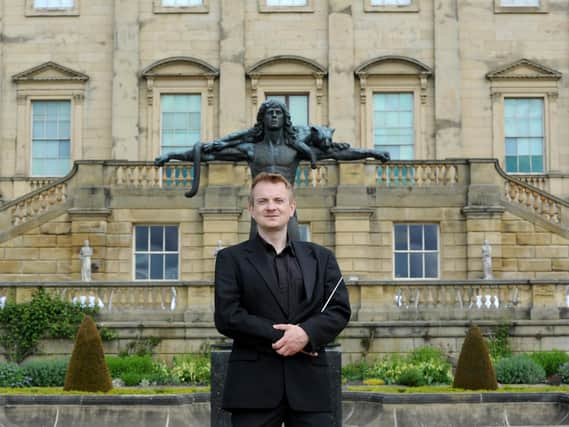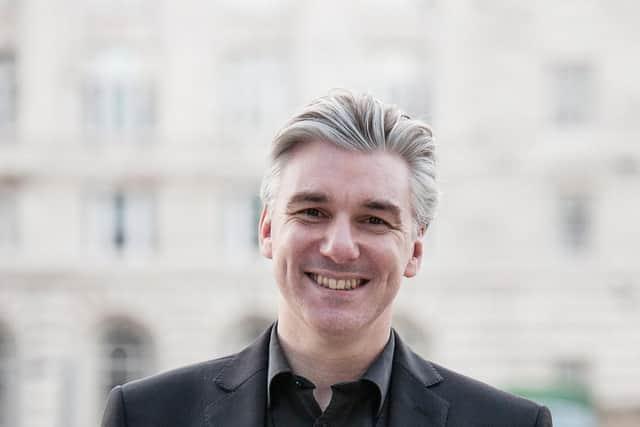The story behind the revival of the Yorkshire Symphony Orchestra after more than 60 years away


“When my mum was heavily pregnant with me, she was going through a spell of listening to Tchaikovsky. At the end of a symphony when the brass came steaming in, she said I would kick, but I would kick in time with the music,” he laughs.
Anthony’s parents were in the Salvation Army in Castleford, where he grew up and now lives. His uncle taught him to play the cornet aged six, and he joined the junior band. A scholarship to Ackworth School opened doors. He went on to graduate from Hull University and did post graduate studies at the Royal Scottish Academy of Music and Drama.
Advertisement
Hide AdAdvertisement
Hide AdOver the years, his career saw him duet on stage with Sting and perform for Pope Benedict XVI. He’s played on albums for Shirley Bassey to Gorillaz, and toured the world as a soloist trumpeter. As a session player, Anthony has performed on over 400 albums. Just before the first lockdown, he had begun a trial period with the BBC Philharmonic.


So, if a ballerina called Fatima’s next job is in cybersecurity, what’s next for a trumpet player called Anthony? “I’m working as a labourer three days a week for a builder, who is a friend of mine,” he says, despite having no prior experience. “I know he asked me because I was out of work.”
Anthony was one of an estimated three million who couldn’t access government support. “The assumption is you’re really wealthy because you’ve got your own business, but of course that’s not the case. So, I couldn’t get furlough, and I wasn’t self-employed, so wasn’t eligible for any grants, so then it was a matter of, what can I do?”
Not being able to perform for 15 months has also hit hard on many musicians’ mental well-being. But Anthony is now a member of the newly revived Yorkshire Symphony Orchestra which has been re-formed after 66 years since its demise, specifically to support musicians hit hard by the pandemic.
Advertisement
Hide AdAdvertisement
Hide AdIt’s been co-founded by Jamie Hudson, Director of Vivo Entertainment and Skipton Camerata’s Artistic Director, the composer and musician, Ben Crick, who is its new conductor. Leeds-based Vivo Entertainment has programmed a three-day outdoor Picnic Proms at Harewood House in September featuring Alfie Boe, Sir Willard White, and Queen Symphonic. The concerts provide a financial as well as artistic footing to launch the new orchestra.
Proudly working class, Ben is a Huddersfield-born son of a council worker and a teacher and the grandson of miners, and he now lives in rural Skipton. He’s held a BBC Music Fellowship, worked with orchestras around the world, and once parted ways with an agent who insisted he move to London for his career.
“The classical music industry has always been financially hard. If you’re a violinist, it’s an incredibly high cost to set up as a professional. Instruments are upward of £50,000, and the amount of training is comparable to a high-end medic,” says Ben.
“There’s a real fear that it’s a hobby for the already wealthy. That’s what it mustn’t be, or it becomes a very sterile place to make art. We must fight against that. And the way to fight against it is to make sure it is a viable career.”
Advertisement
Hide AdAdvertisement
Hide AdThe pandemic stopped the industry in its tracks. “It’s tough to recover,” Ben says. “I think innovation and flexibility in how we see classical music, what classical music is in society and who it is for, are the questions we need to have to make the industry viable in the future.”
Ben believes that starts with bringing music into education. “If we want a diverse, varied music profession both in terms of a proper working-class involvement and race diversity, we need people starting instruments at four or five, because it’s a skill that takes 20 years to gain.”
Diversity for Ben is simply ensuring every individual has the same opportunities. The more diverse voices playing, the more they connect to a wider audience.
The Yorkshire Symphony Orchestra is about providing a voice for the North. “Ultimately music is an expression of who you are. At its best, it’s a snapshot of the human experience in sound. So, when Beethoven wrote the Eroica Symphony at the height of the Napoleonic wars, that is what it was to be a human alive in post-revolutionary France in the early 1800s.
Advertisement
Hide AdAdvertisement
Hide Ad“I want to tell my story and hear other people’s stories. The dream for the Yorkshire Symphony Orchestra is to provide a musical and cultural voice for Yorkshire and the North of England,” he says. “I’m not saying classical music is for everyone, it isn’t, but it should be available for anyone. Why shouldn’t northerners get a comparable exposure and experience to people in London?”
For Anthony, the time is right for the Yorkshire Symphony Orchestra. “Sheffield’s the largest city in Europe to not have a professional orchestra,” he says. “It’s really strange, for its size and strength. Leeds has Northern Ballet and Opera North, so I think the Yorkshire Symphony Orchestra would be great, and potentially one of the most exciting things that lockdown has brought us.”
He, like Ben, believes music has a power that is vital to the human experience. The two days Anthony is not working as a labourer, he’s teaching. Currently, he’s supporting an initiative for the Arts Council running a music project on Zoom to support those isolated by Covid.
Before Anthony became the busiest trumpeter in the north, he spent two years as Music Director to the Salvation Army in Texas. His role included running music programmes for disadvantaged kids at risk from gang culture, and playing at rehab centres for addicts. Music, he said, is increasingly used too by medical professions, particularly supporting those with dementia.
Advertisement
Hide AdAdvertisement
Hide Ad“I don’t think we should get to the stage where we have dementia to realise the value of classical music. We can’t overestimate how valuable music is to us. The left and the right brain are quite separate – mathematical and creative – and what music tuition does it actively creates the cortex that links left and right together.
“If you see x-rays of brains when they’re listening to music, it fires synapses all over the place, and the whole of the brain lights up, not just one area. Lots of things will stimulate one area of the brain, but music stimulates the whole thing. It’s incredible to see.”
He feels we all need music. “I hope for the good of my industry and also for the general good of people, that classical music is one of those things people will seek out. I really hope so.”
Ben agrees. “We need musicians and artists now more than ever; we are the people who care for people’s mental health.”
Advertisement
Hide AdAdvertisement
Hide AdTo book tickets to see the Yorkshire Symphony Orchestra, go to: vivolive.co.uk
Orchestra enjoys a welcome revival
The orchestra was established in Leeds in 1947 and disbanded in 1955. One of the original founders was Richard Noel Middleton, the great grandfather of Catherine, Duchess of Cambridge.
Formed to fill the post-war cultural void, the orchestra’s audiences in Leeds Town Hall included Alan Bennett and David Hockney. Bennett recalls his boyhood weekly visits to watch the orchestra there in his diaries. In 2014, he featured in a BBC radio documentary Death of an Orchestra, charting its history and demise.
The Leeds-based Vivo Entertainment has programmed a series of concerts for the orchestra’s re-launch, including a three-day outdoor Picnic Proms at Harewood House.